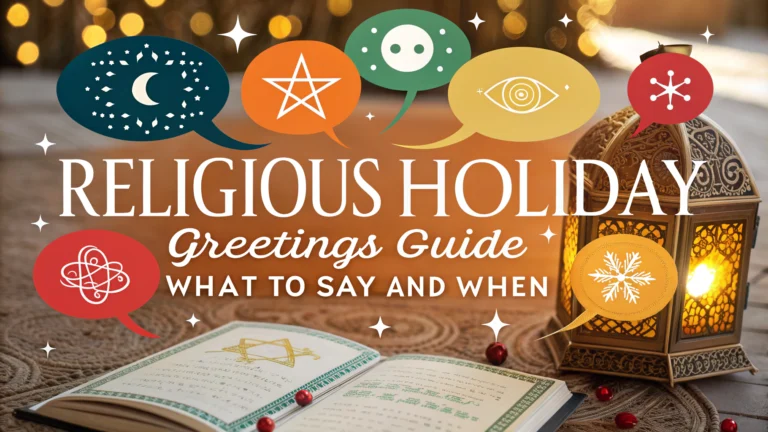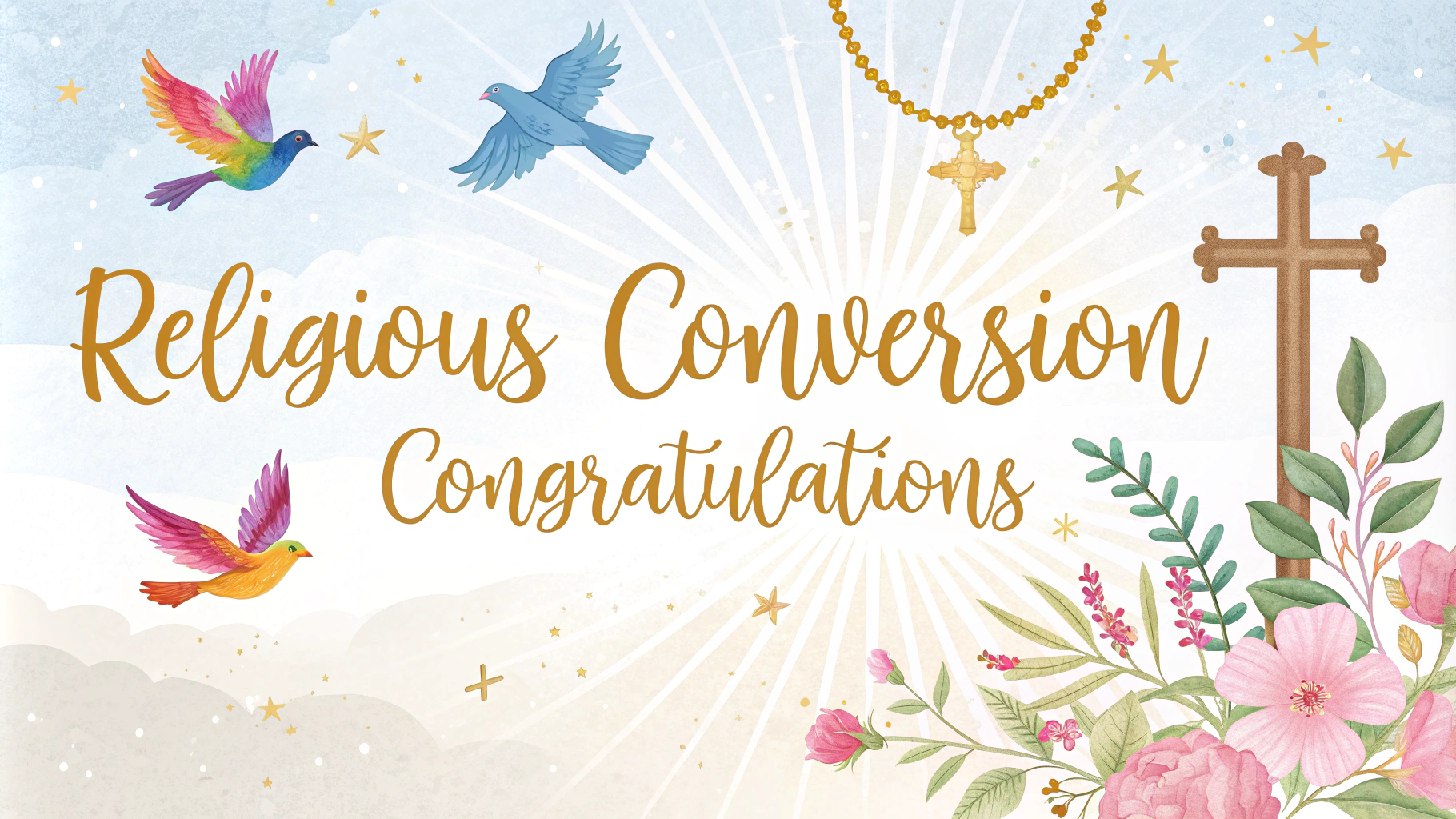Understanding how to respectfully acknowledge different religious holidays can help build stronger relationships and show cultural awareness.
Common Religious Holiday Greetings
Christian Holidays
- Christmas: “Merry Christmas” (most common), “Happy Christmas” (British)
- Easter: “Happy Easter,” “Blessed Easter”
- Good Friday: “Have a blessed Good Friday”
Jewish Holidays
- Hanukkah: “Happy Hanukkah,” “Chag Sameach” (Happy Holiday)
- Rosh Hashanah: “L’Shana Tovah” (For a Good Year)
- Yom Kippur: “Have an easy fast,” “G’mar Chatima Tova”
Muslim Holidays
- Ramadan: “Ramadan Mubarak” (Blessed Ramadan), “Ramadan Kareem” (Generous Ramadan)
- Eid al-Fitr: “Eid Mubarak” (Blessed Festival)
- Eid al-Adha: “Eid Mubarak”
Tips for Appropriate Holiday Greetings
When unsure about someone’s religious background, “Happy Holidays” or “Season’s Greetings” are respectful, inclusive options.
Listen to how others greet you first – this can provide clues about their preferences.
Learn the correct pronunciation of traditional greetings to show respect and consideration.
Timing of Religious Holidays
| Holiday | Typical Timing |
|---|---|
| Christmas | December 25 |
| Hanukkah | November-December (varies yearly) |
| Ramadan | Varies yearly (follows Islamic calendar) |
Professional Settings
- Use inclusive language in business communications
- Consider company-wide policies on holiday greetings
- Acknowledge multiple holidays during seasonal celebrations
Common Mistakes to Avoid
- Assuming everyone celebrates the same holidays
- Using religious greetings without knowing someone’s background
- Mixing up holiday traditions or customs
Learning about different religious holidays and their appropriate greetings helps create an inclusive and respectful environment for everyone.
Resources for Further Learning
- Interfaith Calendar – Complete religious holiday calendar
- Harvard’s Pluralism Project – Religious diversity resources
Celebrations and Customs
Food and Gatherings
- Many religious holidays center around special meals
- Understanding dietary restrictions (kosher, halal, fasting periods)
- Respect for those who observe food-related customs
Gift-Giving Traditions
- Different expectations across religions
- Appropriate timing for exchanging gifts
- Cultural sensitivity in gift selection
Workplace Considerations
Holiday Time Off
- Flexible scheduling for different religious observances
- Clear communication about holiday policies
- Accommodating religious practices during work hours
Decorations and Celebrations
- Inclusive holiday decorating guidelines
- Balance in representing different traditions
- Options for participation in holiday events
Digital Communication
- Appropriate holiday email signatures
- Social media awareness during religious holidays
- Virtual celebration etiquette
Conclusion
Religious holiday greetings represent opportunities to build cultural bridges and demonstrate respect for diverse traditions. By understanding appropriate greetings, timing, and customs, we can create more inclusive environments in both personal and professional settings. Remember that learning about different religious practices is an ongoing process that enriches our communities and strengthens relationships.
The key to successful holiday acknowledgment lies in maintaining sensitivity, staying informed, and approaching differences with genuine respect and openness to learning.
FAQs
- Is it appropriate to wish someone a happy religious holiday if I don’t celebrate it myself?
Yes, it’s generally appreciated when people acknowledge others’ religious holidays respectfully, even if they don’t celebrate them personally. It shows cultural awareness and consideration. - What’s the proper greeting for Hanukkah?
“Happy Hanukkah” or “Chag Sameach” (meaning “Happy Holiday” in Hebrew) are both appropriate. Some also say “Hanukkah Sameach,” which specifically means “Happy Hanukkah.” - When should I say “Merry Christmas” vs. “Happy Holidays”?
Use “Merry Christmas” when you know someone celebrates Christmas. “Happy Holidays” is more inclusive and appropriate when you’re unsure of someone’s religious beliefs or when addressing a diverse group. - What is the correct greeting for Ramadan?
“Ramadan Mubarak” (meaning “Blessed Ramadan”) or “Ramadan Kareem” (meaning “Generous Ramadan”) are both traditional and appropriate greetings during Ramadan. - How do you greet someone during Diwali?
“Happy Diwali” or “Shubh Diwali” are common greetings. “Diwali ki Shubhkamnayein” is also used, meaning “Diwali Greetings” in Hindi. - What’s the appropriate response when someone wishes you a happy holiday you don’t celebrate?
A simple “Thank you” or “Thank you, that’s kind of you” is appropriate and polite. There’s no need to explain that you don’t celebrate it. - When should religious holiday greetings be offered?
Greetings should be offered during the actual holiday period or in the immediate days leading up to it, not weeks before or after the celebration. - What’s an appropriate greeting for Eid?
“Eid Mubarak” is the traditional and most widely used greeting for both Eid al-Fitr and Eid al-Adha. It means “Blessed Festival” in Arabic. - How can I avoid offending someone when extending holiday greetings?
Be sincere, respectful, and when in doubt, use more general greetings like “Happy Holidays” or ask colleagues about their traditions directly if you have a comfortable relationship. - Is it appropriate to include religious holiday greetings in professional communications?
In professional settings, it’s best to use inclusive language unless you’re certain of the recipient’s religious observances. Many organizations opt for secular greetings in official communications.







